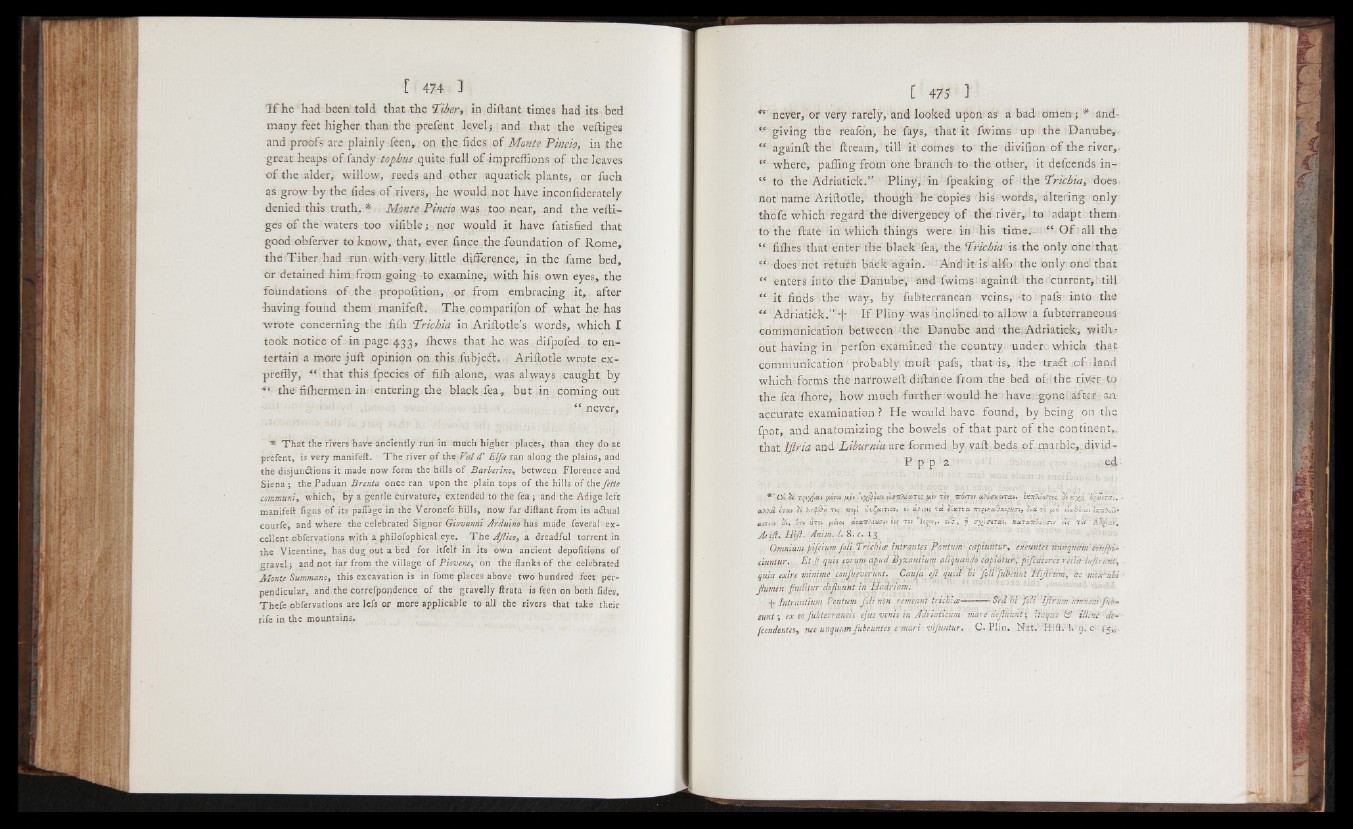
IIl|M| illi IIIÉÉ
■ Hl
I
M i
j l j i
B
| ! i|
mm
BimF /i r’-{fl!
||iffl
B
B i t
I f he had been told that the Tiber, in diftant times had its bed
many feet higher than the prefent level; and that the veftiges
and proofs are plainly feen, on the fides of Monte Pincio, in the
great heaps o f fandy tophus quite full o f impreffions of the leaves
of the alder, willow, reeds and other aquatick plants, or fuch
as grow by the fides- o f rivers, he would not have inconfiderately
denied this truth. * Monte Pincio was too near, and the veftiges
o f the waters too vifible; nor would it have fatisfied that
good obferver to know, that, ever fince the foundation o f Rome,
the Tiber had run with very little difference, in the fame bed,
or detained him from going to examine, with his own eyes, the
foundations o f the propoiition, or from embracing it, after
having found them manifeft. The comparifon o f what he has
wrote concerning the fiih Trichia in Ariftotle’s words, which I
took notice o f in page 433, ihews that he was difpofed to entertain
a more juft opinion on this fubjeit. Ariftotle wrote ex-
preffly, “ that this fpecies o f fiih alone, was always caught by
the fifhermen in entering the. black fea., but in coming out
“ .never,
* Th a t the rivers have anciently run in much higher places, than they do at
prefent, is very manifeft. T h e river of the Val d' Elfa ran along the plains, and
the disjunctions it made now form the hills of Barberino, between Florence and
Siena; the Paduan Brenta once ran upon the plain tops of the hills of the fitie
communi, which, by a gentle curvature,-extended to the'fea ; and the Adige left
manifeft figns of its pafiage in the Veronefe hills, now far diftant from its act mil
courie, and where the celebrated Signor Giovanni Ardumo lias made feveral -excellent
obfervations with a.phildfophical eye. T h e Ajiico, -a dreadful torrent in
the Vicentine, has dug out a bed for itfelf in its own ancient depoiitions of
gravel; and not far from the village of Biovens, on the flanks of the celebrated
Monts Summano, this excavation is in fome places above two hundred feet perpendicular,
and the correfpondence of the gravelly ftrata is feen on both fides.
Thefe obfervations are lefs or more applicable to all the rivers that take their
rife in the mountains.
never, or very rarely, and looked upon as a bad omen ; * and-
“ giving the reafon, he fays, that it fwims up the Danube,.
“ againft the ftream, till it comes to the divifion o f the river,-
“ where, paffing from one branch to the other, it defcends in-
“ to the Adriatick.” Pliny,1 ; in fpeaking of the Trichia, does-
not name Ariftotle, though he copies his words, altering only
thofe which regard the divergency o f the river, to adapt them-
to the ftate in which things were in his time.. “ O f all the
“ fifties that enter the black fea; the Trichia is the only one that
“ does net return back again. -Anddt is'alfo the only: one that
“ enters into the Danube, and fwims againft the current, till
“ it findsc the wày, by fubterrànean veins,1-to ¡'pafs-rinto the
“ Adriatick.” 4 I f Pliny was inclined to allow a fubterraneous
communication between the Danuhe and the. Adriatick, with -
out having in- perfon examined the country under- which that
communication probably, muft pafs, that is ;. the tratft ¡o f, land
which forms the narroweft diftance from the bed o f'th e river, tp
the fea ftiore, how much further would he have-gone-after aa
accurate examination ? He would have found,. by being on the -
fpot, and anatomizing the bowels o f that part o f the continent,.,
that IJlria and Liburnia are formed by vaft beds cf.tmrbic, divid-
P p p 2. - cd-
* ‘ O i ftEv, r r s i ./ttv TP? -nrovrop aAte'xtìyTcci,- s x t tX ìW e ; o ja r r a ] , -
uAAci c.Tctv Ä f T K . V tp i f u f e p f o r , oi n è / f x j v a m g u eaSc tfjife -t, diet to ¡.y-j ¡àcoSlsca ì r a rX u v
u n to » '$£, , OT* a r a i [/.¿voi tx!ce.rrr>ÌHatv è»? top -e7§’, y crficrìTc&i, xctTanìAS&o-i'j s k ' Vqp -
Arifl. Hiß- Änim.J. 8. c. 13
Omnium, pifeium foli Trichia ìntrantes Pcnium' capìÙniur, exeunt es -’ndiiqkdbASéiffi*- -
ciuniur. Ei fi quis forum àbud Byzantium ahqùandpcdpiìctiuèìflifàttor&rèttbdiijìrèiity
quia exire minime confa ever unt. Cauta efl quod hi foli juèeunì fitßTüm-, àc nioxktibi
flymen finditur deßuunt in Badriam.
^ Jntrnntium Pqntum- foli non remiani trich:#'-- ——■ Sra bijou'1 Ißrum dtn^èmfub^
eunt j ex eo fubterr aneis ejus venis in Adria ficum maredeßuunt' ; Hfqìfè ' & 'slliric de~-
feendentesoy nee- unquem fubeuntes e'mari vifuntur» C . Plin, Nät. Hift. lv 9. c 15^.